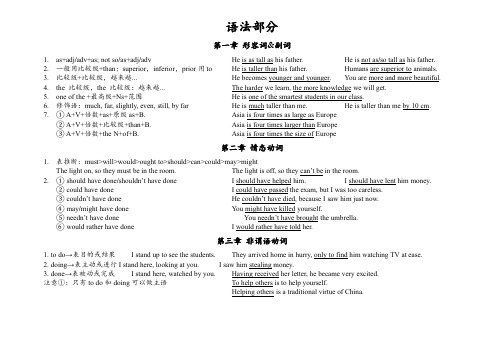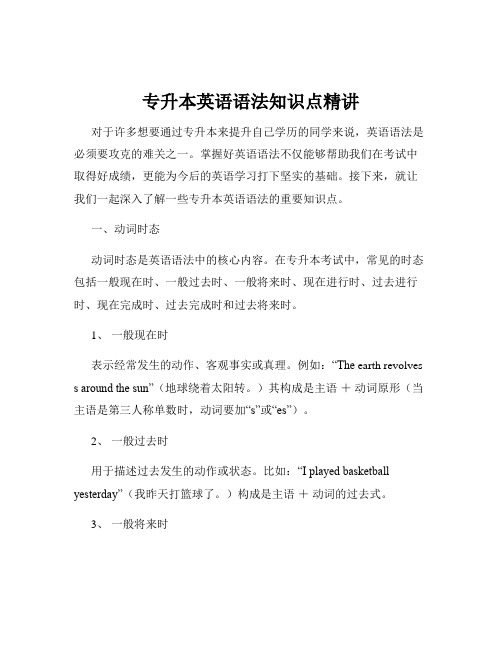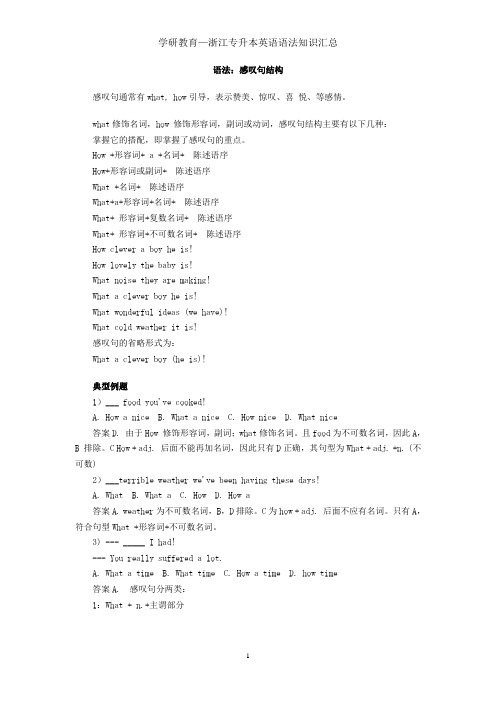浙江专升本英语考试基本语法知识汇总
专升本英语语法与词汇知识点总结

专升本英语语法与词汇知识点总结在专升本的英语考试中,语法和词汇是两个至关重要的部分。
掌握好这两方面的知识,对于提升英语成绩和语言运用能力有着举足轻重的作用。
下面,我将为大家详细总结专升本英语中常见的语法和词汇知识点。
一、语法知识点(一)动词时态1、一般现在时表示经常发生的动作、存在的状态或客观真理。
其构成是主语+动词原形(当主语是第三人称单数时,动词要加“s”或“es”)。
例如:“He often goes to school by bike”2、一般过去时表示过去发生的动作或存在的状态。
构成是主语+动词的过去式。
如:“I played basketball yesterday”3、现在进行时表示正在进行的动作。
其结构是“主语+ be 动词+动词的现在分词”。
比如:“They are watching TV now”4、过去进行时强调过去某个时间正在进行的动作,形式为“主语+ was/were +动词的现在分词”。
像:“I was reading a book at that time”5、现在完成时表示过去发生的动作对现在造成的影响或结果,或者从过去开始一直持续到现在的动作。
其构成是“主语+ have/has +过去分词”。
例如:“She has learned English for five years”6、过去完成时表示过去某个时间之前已经完成的动作,结构是“主语+ had +过去分词”。
比如:“By the end of last year, we had learned 2000 words”(二)语态1、主动语态主语是动作的执行者。
例如:“He opened the door”2、被动语态主语是动作的承受者,构成是“be +过去分词”。
如:“The door was opened by him”(三)非谓语动词1、动词不定式具有名词、形容词和副词的特征,可作主语、宾语、定语、状语等。
专升本英语词汇和语法考点总结

专升本英语词汇和语法考点总结词汇一、名词和代词一)重点名词和代词辨析1、result,effect,outcome,ending,consequence,fruitresult 普通用词,多指好的结果.另:比分,成绩;effect 名词:效果,影响。
动词:实现;outcome 多指成就,成果;ending 结局,结尾;consequence 多指不良的结果,后果;fruit 水果,产物。
2、feature,appearance,virtue,character,characteristicsfeature 1,特色,2,面貌,相貌;appearance1,出现,露面2,外观,外貌,外表;virtue 1,美德,2,优点,长处;character特征,品质,角色;characteristics特性,特色。
3、accident,incident,event,conflict,trouble,occurrence,crash,crisis accident 事故,意外。
意想不到的事情,往往引起损伤或伤害;incident事件,小插曲。
事变(外交,政治中的政变);event 特指重大事件;conflict冲突,矛盾;trouble烦恼,麻烦;occurrence 1,发生,出现。
2,突发事件;crash使(飞机)坠毁、使(车辆)猛撞等;crisis危机,紧急关头。
4、currency,income,wage,bonus,salary,award,reward,fee,allowance,honour,benefit,profit,interest,prize,wealth,capital,money,cash,coin,fund,debt,loancurrency 流通货币,经济学用词;Income泛指收入;Wage 特指工资;Bonus指提成的奖金;Salary = wage + bonus 薪水;Award授予的奖项,包括奖励的奖金;Reward 回报,报酬,酬金;Fee泛指费用;Allowance 表示津贴,补贴;honour 荣誉,名誉。
浙江专升本语法部分总结

语法部分第一章形容词&副词1.as+adj/adv+as; not so/as+adj/adv He is as tall as his father. He is not as/so tall as his father.2.一般用比较级+than;superior,inferior,prior用to He is taller than his father. Humans are superior to animals.3.比较级+比较级,越来越... He becomes younger and younger. You are more and more beautiful.4.the 比较级,the 比较级:越来越... The harder we learn, the more knowledge we will get.5.one of the +最高级+Ns+范围He is one of the smartest students in our class.6.修饰语:much, far, slightly, even, still, by far He is much taller than me. He is taller than me by 10 cm.7.① A+V+倍数+as+原级as+B. Asia is four times as large as Europe② A+V+倍数+比较级+than+B. Asia is four times larger than Europe③ A+V+倍数+the N+of+B. Asia is four times the size of Europe第二章情态动词1.表推断:must>will>would>ought to>should>can>could>may>mightThe light on, so they must be in the room. The light is off, so they can’t be in the room.2.① should have done/shouldn’t have done I should have helped him. I should have lent him money.② could have done I could have passed the exam, but I was too careless.③ couldn’t have done He couldn’t have died, because I saw him just now.④ may/might have done You might have killed yourself.⑤ needn’t have done You needn’t have brought the umbrella.⑥ would rather have done I would rather have told her.第三章非谓语动词1.to do→表目的或结果I stand up to see the students. They arrived home in hurry, only to find him watching TV at ease.2.doing→表主动或进行 I stand here, looking at you. I saw him stealing money.3.done→表被动或完成I stand here, watched by you. Having received her letter, he became very excited.注意①:只有to do和doing可以做主语To help others is to help yourself.Helping others is a traditional virtue of China.第四章时态一现现在的事情do/does/am/is/are I often study English.一过过去的事情did/was/were I studied English last year.一将将来的事情will+do I will start studying English next year.现进现在正在做某事am/is/are+doing I am studying English.过进过去某时刻正在做某事was/were+doing I was studying English when the teacher came in.将进将来某时刻正在做某事will be+doing I will be studying English tomorrow 8:00.现完现在完成/搞定了某事have/has+done I have studied English for 10 years.过完过去某时完成/搞定了某事had+done I had studied English for 5 years before I went to high school.将完将来某时完成/搞定了某事will have+done I will have studied English for 6 months by the end of the year.现完进过去到现在一直在做某事have been+doing I have been studying English for 10 years.过将从过去看将来的事would+do I said I would study English hard.注意①:be going to do/be to do/be about to do/be doing 也可表示将来I’m going to visit my grandpa tomorrow. You are to do your homework. I’m about to sleep. I’m coming.注意②:过去时纯属过去,只用于描述+具体过去时间I met him yesterday. 只表达昨天遇到了现在完成时强调对现在的影响+ 模糊时间I have met him. 想表达遇到过他,可能聊过什么。
英语专升本语法知识点汇总

英语专升本语法知识点汇总一、时态。
1. 一般现在时。
- 用法:- 表示经常或习惯性的动作或存在的状态。
例如:I go to school by bike every day.(我每天骑自行车去上学。
)- 表示客观事实或普遍真理。
例如:The earth moves around the sun.(地球绕着太阳转。
)- 结构:- 主语为第三人称单数(he/she/it等)时,动词要加 -s或 -es,如He likes reading. 其他人称用动词原形,如I like reading.2. 一般过去时。
- 用法:- 表示过去某个时间发生的动作或存在的状态。
例如:I visited my grandparents last weekend.(我上周末去看望了我的祖父母。
)- 结构:- 动词一般用过去式形式。
规则动词的过去式一般在词尾加 -ed,如work - worked;不规则动词有其特殊的过去式形式,如go - went。
3. 一般将来时。
- 用法:- 表示将来某个时间要发生的动作或存在的状态。
例如:I will go to Beijing next month.(我下个月将去北京。
)- 结构:- 常见的结构有will+动词原形,be going to+动词原形(表示计划、打算做某事或有迹象表明即将发生某事)。
如He is going to have a party tonight.(他今晚打算举办一个聚会。
)4. 现在进行时。
- 用法:- 表示现在正在进行的动作或存在的状态。
例如:She is reading a book now.(她现在正在读一本书。
)- 结构:- be动词(am/is/are)+动词的 -ing形式。
5. 过去进行时。
- 用法:- 表示过去某个时刻或某段时间正在进行的动作。
例如:I was watching TV at 8 o'clock last night.(昨晚8点我正在看电视。
专升本英语语法重点汇总

专升本英语语法重点汇总1.主谓一致- 单数主语与单数谓语动词搭配,如"The cat is sleeping."- 复数主语与复数谓语动词搭配,如"The cats are sleeping."- 不定代词"everyone, everybody, someone, somebody"的主语与谓语动词搭配时,使用第三人称单数形式,如"Everybody loves ice cream."2.时态- 现在进行时:表示目前正在发生的动作或临时的动作,一般由“be + 现在分词”构成,如"She is reading a book."- 现在完成时:表示过去发生的一种持续的动作或状态,与现在的影响或结果有关,一般由“have/has + 过去分词”构成,如"They have finished their homework."- 过去进行时:表示过去其中一具体时间正在进行的动作,一般由“was/were + 现在分词”构成,如"We were playing basketball yesterday."- 过去完成时:表示在过去其中一时间或动作之前已经完成的动作,一般由“had + 过去分词”构成,如"She had already eaten when I arrived."3.强调句- 强调句是为了将强调句子中的一些成分突出表达,一般由“Itis/was + 被强调部分 + that/who + 原句其余部分”构成,如"It was John who told me the good news."- 当强调句的被强调部分是动词时,需使用“do/does/did”来构成强调句,如"It was he who did all the work."4.虚拟语气- 与现在事实相反的虚拟语气,使用"would, could, might"等情态动词与原型动词搭配,如"If I were you, I would go to the party."- 与过去事实相反的虚拟语气,使用"had + 过去分词"构成,如"IfI had known, I would have helped him."5.定语从句- 定语从句用来修饰先行词,修饰的内容可以是人、事物或整个句子,一般由关系代词"who, whom, whose, which, that"或关系副词"where, when, why"引导,如"The book that I bought is very interesting."6.名词性从句- 主语从句:作为句子的主语,一般由"that, whether, who, whom, which"引导- 宾语从句:作为句子的宾语,一般由"that, whether, if, what, who, whom, which"引导,如"I don't know what to do."- 表语从句:位于系动词之后,与主语构成等价关系,一般由"that, whether, who, whom, which"引导,如"The important thing is that you try your best."7.比较级和最高级- 比较级用来比较两个人或物之间的差异,一般在形容词或副词前加"more"或"less"构成,如"She is taller than her sister."- 最高级用来表示三个或三个以上人或物之间的差异,一般在形容词或副词前加"the most"或"the least"构成,如"He is the tallest boy in the class."以上是专升本英语语法的重点汇总,希望对你的学习有所帮助。
专升本英语语法基础知识速记

专升本英语语法基础知识速记在专升本的英语考试中,语法是一个重要的部分。
掌握好语法基础知识,对于提高英语成绩、增强英语应用能力都有着至关重要的作用。
接下来,让我们一起快速了解一下专升本英语语法的基础知识。
一、词性(一)名词名词是表示人、事物、地点或抽象概念的名称的词。
例如:“book (书)”“student(学生)”“city(城市)”等。
名词有可数和不可数之分,可数名词又有单数和复数形式。
1、可数名词变复数的规则:一般在词尾加 s,如:book books。
以 s,x,ch,sh 结尾的加 es,如:box boxes,watch watches。
以辅音字母+ y 结尾的,把 y 变 i 再加 es,如:city cities。
以 f 或 fe 结尾的,把 f 或 fe 变为 v 再加 es,如:leaf leaves,knife knives。
不规则变化,如:man men,child children 等。
(二)动词动词是表示动作或状态的词。
根据其在句子中的功能,可分为实义动词、系动词、助动词和情态动词。
1、实义动词及物动词:后面可以直接跟宾语,如:read a book(读书)。
不及物动词:后面不能直接跟宾语,若要跟宾语,需要加上相应的介词,如:look at the picture(看这张图片)。
2、系动词表示状态的:be(am/is/are/was/were)。
表示感官的:look,sound,smell,taste,feel。
表示变化的:become,get,turn,grow,go 等。
3、助动词帮助构成各种时态、语态和语气,如:do/does/did,have/has/had,will/would 等。
4、情态动词表示说话人的语气和态度,如:can/could,may/might,must,should,ought to 等。
(三)形容词形容词是用来修饰名词或代词,表示人或事物的性质、特征或状态的词。
专升本英语语法知识点精讲

专升本英语语法知识点精讲对于许多想要通过专升本来提升自己学历的同学来说,英语语法是必须要攻克的难关之一。
掌握好英语语法不仅能够帮助我们在考试中取得好成绩,更能为今后的英语学习打下坚实的基础。
接下来,就让我们一起深入了解一些专升本英语语法的重要知识点。
一、动词时态动词时态是英语语法中的核心内容。
在专升本考试中,常见的时态包括一般现在时、一般过去时、一般将来时、现在进行时、过去进行时、现在完成时、过去完成时和过去将来时。
1、一般现在时表示经常发生的动作、客观事实或真理。
例如:“The earth revolves s around the sun”(地球绕着太阳转。
)其构成是主语+动词原形(当主语是第三人称单数时,动词要加“s”或“es”)。
2、一般过去时用于描述过去发生的动作或状态。
比如:“I played basketball yesterday”(我昨天打篮球了。
)构成是主语+动词的过去式。
3、一般将来时表示将来要发生的动作,常见的表达有“will +动词原形”和“be going to +动词原形”。
例如:“I will go to Beijing next week” (我下周要去北京。
)4、现在进行时表示正在进行的动作,结构为“be +现在分词”。
如:“She is reading a book now”(她现在正在读书。
)5、过去进行时强调过去某个时刻正在进行的动作,“was/were +现在分词”是其构成形式。
像:“I was watching TV at 8 o'clock last night” (昨晚八点我正在看电视。
)6、现在完成时表示过去发生的动作对现在造成的影响或结果,或者从过去开始一直持续到现在的动作。
“have/has +过去分词”为其结构。
例如:“I have learned English for five years”(我学英语已经五年了。
)7、过去完成时在过去某个时间点之前已经完成的动作,由“had +过去分词”构成。
浙江专升本英语考试基本语法知识汇总

语法:感叹句结构感叹句通常有what, how引导,表示赞美、惊叹、喜悦、等感情。
what修饰名词,how 修饰形容词,副词或动词,感叹句结构主要有以下几种:掌握它的搭配,即掌握了感叹句的重点。
How +形容词+ a +名词+陈述语序How+形容词或副词+陈述语序What +名词+陈述语序What+a+形容词+名词+陈述语序What+ 形容词+复数名词+陈述语序What+ 形容词+不可数名词+陈述语序How clever a boy he is!How lovely the baby is!What noise they are making!What a clever boy he is!What wonderful ideas (we have)!What cold weather it is!感叹句的省略形式为:What a clever boy (he is)!典型例题1)___ food you've cooked!A. How a niceB. What a niceC. How niceD. What nice答案D. 由于How 修饰形容词,副词;what修饰名词。
且food为不可数名词,因此A,B 排除。
C How + adj. 后面不能再加名词,因此只有D正确,其句型为What + adj. +n. (不可数)2)___terrible weather we've been having these days!A. WhatB. What aC. HowD. How a答案A. weather为不可数名词,B,D排除。
C为how + adj. 后面不应有名词。
只有A,符合句型What +形容词+不可数名词。
3) --- _____ I had!--- You really suffered a lot.A. What a timeB. What timeC. How a timeD. how time答案A.感叹句分两类:1:What + n.+主谓部分2:How + adj. / adv. / v.+主谓部分。
- 1、下载文档前请自行甄别文档内容的完整性,平台不提供额外的编辑、内容补充、找答案等附加服务。
- 2、"仅部分预览"的文档,不可在线预览部分如存在完整性等问题,可反馈申请退款(可完整预览的文档不适用该条件!)。
- 3、如文档侵犯您的权益,请联系客服反馈,我们会尽快为您处理(人工客服工作时间:9:00-18:30)。
语法:感叹句结构感叹句通常有what, how引导,表示赞美、惊叹、喜悦、等感情。
what修饰名词,how 修饰形容词,副词或动词,感叹句结构主要有以下几种:掌握它的搭配,即掌握了感叹句的重点。
How +形容词+ a +名词+陈述语序How+形容词或副词+陈述语序What +名词+陈述语序What+a+形容词+名词+陈述语序What+ 形容词+复数名词+陈述语序What+ 形容词+不可数名词+陈述语序How clever a boy he is!How lovely the baby is!What noise they are making!What a clever boy he is!What wonderful ideas (we have)!What cold weather it is!感叹句的省略形式为:What a clever boy (he is)!典型例题1)___ food you've cooked!A. How a niceB. What a niceC. How niceD. What nice答案D. 由于How 修饰形容词,副词;what修饰名词。
且food为不可数名词,因此A,B 排除。
C How + adj. 后面不能再加名词,因此只有D正确,其句型为What + adj. +n. (不可数)2)___terrible weather we've been having these days!A. WhatB. What aC. HowD. How a答案A. weather为不可数名词,B,D排除。
C为how + adj. 后面不应有名词。
只有A,符合句型What +形容词+不可数名词。
3) --- _____ I had!--- You really suffered a lot.A. What a timeB. What timeC. How a timeD. how time答案A.感叹句分两类:1:What + n.+主谓部分2:How + adj. / adv. / v.+主谓部分。
本题属第一种,但省略了bad,相对于 What a bad time I had! 这是个习惯用语。
语法:祈使句结构祈使句用以表达命令,要求,请求,劝告等。
1)祈使句有两种类型,一种是以动词原形开头,在动词原形之前加do (但只限于省略第二人称主语的句子)。
Take this seat.Do be careful.否定结构:Don't move.Don't be late.2)第二种祈使句以let开头。
Let 的反意疑问句a. Let's 包括说话者Let's have another try,shall we / shan't we?= Shall we have another try?b.Let us 不包括说话者Let us have another try,will you / won't you?= Will you please let us have another try?否定结构:Let's not talk of that matter.Let us not talk of that matter.英语语法:分词分词作定语分词前置We can see the rising sun. 我们可以看到东升的旭日He is a retired worker.他是位退休的工人分词后置 (i分词词组;ii 个别分词如given, left; iii 修饰不定代词 something 等)There was a girl sitting there.有个女孩坐在那里This is the question given.这是所给的问题There is nothing interesting.没有有趣的东西过去分词作定语与其修饰的词是被动关系,相当于一个被动语态的定语从句。
Most of the people invited to the party were famous scientists.Most of the artists invited to the party were from South Africa.典型例题1) The first textbook ___ for teaching English as a foreign language came out in the 16th century.A. have writtenB. to be writtenC. being writtenD. written答案D. 书与写作是被动关系,应用过去分词做定语表被动,相当于定语从句 which is written2)What's the language ____ in Germany?A. speakingB. spokenC. be spokenD. to speak答案B. 主语language与谓语动词之间有被动的含义。
spoken是动词speak的过去分词形式,在句中作定语,修饰主语language, spoken 与language有被动关系。
该句可以理解为:What's the language (which is) spoken in German?语法:动词1)表示动作中状态的词叫做动词。
2)根据其在句中的功能,动词可分为四类,分别是:实义动词(Notional Verb)、系动词(Link Verb)、助动词(Auxiliary Verb)、情态动词(Modal Verb)。
说明:有些情况下,有些动词是兼类词,例如:We are having a meeting.我们正在开会。
(having是实义动词。
)He has gone to New York.他已去纽约。
(has是助动词。
)3)动词根据其后是否带有宾语,可分为两类,分别是:及物动词(Transitive Verb)、不及物动词(Intransitive Verb),缩写形式分别为vt. 和vi.。
说明:同一动词有时可用作及物动词,有时可用作不及物动词。
例如:She can dance and sing.她能***又能跳舞。
(sing在此用作不及物动词。
)She can sing many English songs.她能唱好多首英文歌曲。
(sing用作及物动词。
)4)根据是否受主语的人称和数的限制,可分两类,分别是:限定动词(Finite Verb)、非限定动词(Non-finite Verb)例如:She sings very well.她唱得很好。
(sing受主语she的限制,故用第三人称单数形式sings。
)She wants to learn English well.她想学好英语。
(to learn不受主语she的限制,没有词形变化,是非限定动词。
说明:英语中共有三种非限定动词,分别是:动词不定式(Infinitive)、动名词(Gerund)、分词(Participle)。
5)根据动词的组成形式,可分为三类,分别是:单字词(One-Word Verb)、短语动词(Phrasal Verb)、动词短语(Verbal Phrase)例如:The English language contains many phrasal verbs and verbal phrases.英语里有许多短语动词和动词短语。
(contains是单字动词。
)Students should learn to look up new words in dictionaries.学生们学会查字典。
(look up是短语动词。
)The young ought to take care of the old.年轻人应照料老人。
(take care of是动词短语。
)6)动词有五种形态,分别是:原形(Original Form)、第三人称单数形式(Singular From in Third Personal)、过去式(Past Form)、过去分词(Past Participle)、现在分词(Present Participle)。
语法:动名词动名词作主语、宾语和表语1)作主语Fighting broke out between the South and the North.南方与北方开战了。
2)作宾语a. 动词后加动名词doing作宾语 V. + doing sthadmit 承认appreciate 感激,赞赏avoid 避免complete 完成consider 认为delay 耽误deny 否认detest 讨厌endure 忍受enjoy 喜欢escape 逃脱prevent阻止fancy 想象finish 完成imagine 想象mind 介意miss 想念postpone 推迟practise 训练recall 回忆resent 讨厌resist 抵抗resume 继续risk 冒险suggest 建议face 面对include 包括stand 忍受understand 理解forgive 宽恕keep 继续举例:(1)Would you mind turning down your radio a little, please?(2)The squirrel was lucky that it just missed being caught.b. 词组后接doingadmit to prefer…to be used to lead to devote oneself to object to stick to busy look forward to(to为介词)no good,no use,It's worth…,as well as,can't help,It's no use /good be tired ofbe fond of be capable of be afraid ofbe proud of think of / about hold offput off keep on insist on count on / uponset about be successful in good at take upgive up burst out prevent … from…3)作表语Her job is washing,cleaning and taking care of the children.语法:形容词和副词形容词及其用法形容词修饰名词,说明事物或人的性质或特征。
